Skip to main content
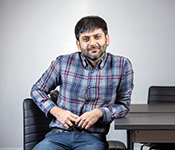 As a computer systems researcher, Allen School professor and alum Ratul Mahajan (Ph.D., ‘05) has helped develop technologies powering the networks that support multiple aspects of modern society — from operating online banking accounts to scrolling social media. The Association for Computing Machinery (ACM) recognized Mahajan among its for his groundbreaking “contributions to network verification and network control systems and their transfer to industrial practice.” Read more →
As a computer systems researcher, Allen School professor and alum Ratul Mahajan (Ph.D., ‘05) has helped develop technologies powering the networks that support multiple aspects of modern society — from operating online banking accounts to scrolling social media. The Association for Computing Machinery (ACM) recognized Mahajan among its for his groundbreaking “contributions to network verification and network control systems and their transfer to industrial practice.” Read more →
February 27, 2026
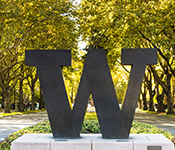 Last month, the Computing Research Association (CRA) recognized a select group of undergraduate students from across North America who have made notable contributions to the field through research. This year’s cohort in the CRA Outstanding Undergraduate Researcher Awards included four Allen School undergraduates — awardee Haoquan Fang, finalist Hao Xu and honorable mention recipients Kaiyuan Liu and Lindsey Wei.
Read more →
Last month, the Computing Research Association (CRA) recognized a select group of undergraduate students from across North America who have made notable contributions to the field through research. This year’s cohort in the CRA Outstanding Undergraduate Researcher Awards included four Allen School undergraduates — awardee Haoquan Fang, finalist Hao Xu and honorable mention recipients Kaiyuan Liu and Lindsey Wei.
Read more →
February 19, 2026
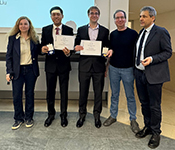 Allen School professor Thomas Rothvoss has carved a career out of complexity. As a member of the school’s Theory of Computation Group, Rothvoss examines the theoretical limits of computer algorithms that are designed to analyze large, complex datasets. His aim is to settle long-standing problems in the field of combinatorial optimization — an area where he has made notable progress since his arrival at the University of Washington in 2014. Last month, Rothvoss collected the inaugural Trevisan Prize in the mid-career category for his breakthrough contributions in the study of optimization problems. Read more →
Allen School professor Thomas Rothvoss has carved a career out of complexity. As a member of the school’s Theory of Computation Group, Rothvoss examines the theoretical limits of computer algorithms that are designed to analyze large, complex datasets. His aim is to settle long-standing problems in the field of combinatorial optimization — an area where he has made notable progress since his arrival at the University of Washington in 2014. Last month, Rothvoss collected the inaugural Trevisan Prize in the mid-career category for his breakthrough contributions in the study of optimization problems. Read more →
February 9, 2026
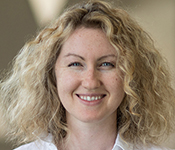 In the 1995 movie “Clueless,” lead character Cher Horowitz has a digital closet that allows her to virtually try on outfits. Proving some ideas never go out of style, Allen School professor Ira Kemelmacher-Shlizerman, director of the UW Reality Lab and member of the UW Graphics & Imaging Group (GRAIL), has spent the past two decades working to make that and other futuristic technologies a reality. The Institute of Electrical and Electronics Engineers (IEEE) recently recognized her in the 2026 class of IEEE Fellows for her “contributions to face, body, and clothing modeling from large image collections.” Read more →
In the 1995 movie “Clueless,” lead character Cher Horowitz has a digital closet that allows her to virtually try on outfits. Proving some ideas never go out of style, Allen School professor Ira Kemelmacher-Shlizerman, director of the UW Reality Lab and member of the UW Graphics & Imaging Group (GRAIL), has spent the past two decades working to make that and other futuristic technologies a reality. The Institute of Electrical and Electronics Engineers (IEEE) recently recognized her in the 2026 class of IEEE Fellows for her “contributions to face, body, and clothing modeling from large image collections.” Read more →
February 3, 2026
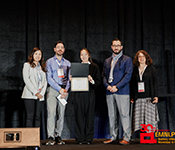 As large language models become more popular and widespread, it becomes increasingly important to understand the composition of their training data and how it affects the model’s behavior. The first step is to make these texts searchable. To make searching on such a large scale more efficient and affordable, researchers at the University of Washington and Allen Institute for Artificial Intelligence (Ai2) developed
infini-gram mini, an efficient search engine designed to handle exact-match search on arbitrarily long queries across Internet-scale corpora with minimal storage overhead. The team received the Best Paper Award at the 2025 Conference on Empirical Methods in Natural Language Processing (EMNLP) last November. Read more →
As large language models become more popular and widespread, it becomes increasingly important to understand the composition of their training data and how it affects the model’s behavior. The first step is to make these texts searchable. To make searching on such a large scale more efficient and affordable, researchers at the University of Washington and Allen Institute for Artificial Intelligence (Ai2) developed
infini-gram mini, an efficient search engine designed to handle exact-match search on arbitrarily long queries across Internet-scale corpora with minimal storage overhead. The team received the Best Paper Award at the 2025 Conference on Empirical Methods in Natural Language Processing (EMNLP) last November. Read more →
January 29, 2026
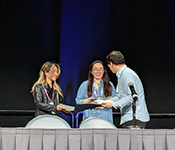 If you ask 10 different people to write a metaphor about time, you might get 10 unique responses. However, if you give the same prompt to 10 large language models (LLMs), you may end up receiving similar outputs across the board — almost like they are all part of an Artificial Hivemind. In a recent study, Allen School researchers introduced Infinity-chat, a benchmark dataset that allows for a systemic evaluation of the creative generation of artificial intelligence models. For revealing a critical limitation in LLMs, the team received the NeurIPS 2025 Best Paper Award. Read more →
If you ask 10 different people to write a metaphor about time, you might get 10 unique responses. However, if you give the same prompt to 10 large language models (LLMs), you may end up receiving similar outputs across the board — almost like they are all part of an Artificial Hivemind. In a recent study, Allen School researchers introduced Infinity-chat, a benchmark dataset that allows for a systemic evaluation of the creative generation of artificial intelligence models. For revealing a critical limitation in LLMs, the team received the NeurIPS 2025 Best Paper Award. Read more →
January 22, 2026
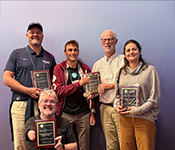 In a user study published in 2009, a team of UW researchers including Allen School professor emeritus Richard Ladner examined how participants with visual and motor disabilities select, adapt and use mobile devices in their everyday lives. Since then, their findings have helped guide new innovations in mobile device accessibility. The team’s paper received the SIGACCESS ASSETS Paper Impact Award, recognizing its “significant impact on computing and information technology that addresses the needs of persons with disabilities.” Read more →
In a user study published in 2009, a team of UW researchers including Allen School professor emeritus Richard Ladner examined how participants with visual and motor disabilities select, adapt and use mobile devices in their everyday lives. Since then, their findings have helped guide new innovations in mobile device accessibility. The team’s paper received the SIGACCESS ASSETS Paper Impact Award, recognizing its “significant impact on computing and information technology that addresses the needs of persons with disabilities.” Read more →
January 7, 2026
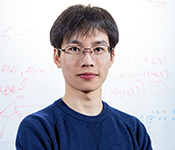 From developing recyclable electronics to leveraging artificial intelligence to estimate carbon footprints and provide personalized health insights, Allen School Ph.D. student Zhihan Zhang is interested in tackling the challenge of sustainability from multiple fronts. To support his work, Zhang was awarded a 2025 Google Ph.D. Fellowship in health research. The fellowship recognizes exceptional graduate students from around the world who represent “the next generation of scientists focused on critical foundational science.”
Read more →
From developing recyclable electronics to leveraging artificial intelligence to estimate carbon footprints and provide personalized health insights, Allen School Ph.D. student Zhihan Zhang is interested in tackling the challenge of sustainability from multiple fronts. To support his work, Zhang was awarded a 2025 Google Ph.D. Fellowship in health research. The fellowship recognizes exceptional graduate students from around the world who represent “the next generation of scientists focused on critical foundational science.”
Read more →
December 17, 2025
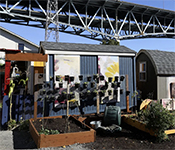 Modern Internet of Things (IoT) technologies such as smart home devices, sensors and security cameras have transformed how we interact with our physical environments. As University of Washington researchers discovered, they also have the potential to help residents living in tiny house villages, a type of emergency shelter for those experiencing homelessness. To learn more about the team’s findings, we spoke with Allen School professor Kurtis Heimerl and Allen School postdoc Esther Han Beol Jang (Ph.D., ‘24). Read more →
Modern Internet of Things (IoT) technologies such as smart home devices, sensors and security cameras have transformed how we interact with our physical environments. As University of Washington researchers discovered, they also have the potential to help residents living in tiny house villages, a type of emergency shelter for those experiencing homelessness. To learn more about the team’s findings, we spoke with Allen School professor Kurtis Heimerl and Allen School postdoc Esther Han Beol Jang (Ph.D., ‘24). Read more →
December 4, 2025
 To help make datasets easier to understand and examine, in 2015, a team of researchers led by Allen School professor Jeffrey Heer introduced Voyager, a system that automatically generates and recommends charts and visualizations based on statistical and perceptual measures — allowing users to efficiently explore different parts of the dataset they may not have discovered before. At IEEE VIS 2025 earlier this month in Vienna, Austria, Heer and his co-authors were recognized with the InfoVis 10-Year Test of Time Award for the Voyager paper’s lasting impact on the field. Read more →
To help make datasets easier to understand and examine, in 2015, a team of researchers led by Allen School professor Jeffrey Heer introduced Voyager, a system that automatically generates and recommends charts and visualizations based on statistical and perceptual measures — allowing users to efficiently explore different parts of the dataset they may not have discovered before. At IEEE VIS 2025 earlier this month in Vienna, Austria, Heer and his co-authors were recognized with the InfoVis 10-Year Test of Time Award for the Voyager paper’s lasting impact on the field. Read more →
November 19, 2025
Older Posts »
 As a computer systems researcher, Allen School professor and alum Ratul Mahajan (Ph.D., ‘05) has helped develop technologies powering the networks that support multiple aspects of modern society — from operating online banking accounts to scrolling social media. The Association for Computing Machinery (ACM) recognized Mahajan among its for his groundbreaking “contributions to network verification and network control systems and their transfer to industrial practice.” Read more →
As a computer systems researcher, Allen School professor and alum Ratul Mahajan (Ph.D., ‘05) has helped develop technologies powering the networks that support multiple aspects of modern society — from operating online banking accounts to scrolling social media. The Association for Computing Machinery (ACM) recognized Mahajan among its for his groundbreaking “contributions to network verification and network control systems and their transfer to industrial practice.” Read more →

 As a computer systems researcher, Allen School professor and alum Ratul Mahajan (Ph.D., ‘05) has helped develop technologies powering the networks that support multiple aspects of modern society — from operating online banking accounts to scrolling social media. The Association for Computing Machinery (ACM) recognized Mahajan among its for his groundbreaking “contributions to network verification and network control systems and their transfer to industrial practice.” Read more →
As a computer systems researcher, Allen School professor and alum Ratul Mahajan (Ph.D., ‘05) has helped develop technologies powering the networks that support multiple aspects of modern society — from operating online banking accounts to scrolling social media. The Association for Computing Machinery (ACM) recognized Mahajan among its for his groundbreaking “contributions to network verification and network control systems and their transfer to industrial practice.” Read more →
 Last month, the Computing Research Association (CRA) recognized a select group of undergraduate students from across North America who have made notable contributions to the field through research. This year’s cohort in the CRA Outstanding Undergraduate Researcher Awards included four Allen School undergraduates — awardee Haoquan Fang, finalist Hao Xu and honorable mention recipients Kaiyuan Liu and Lindsey Wei.
Read more →
Last month, the Computing Research Association (CRA) recognized a select group of undergraduate students from across North America who have made notable contributions to the field through research. This year’s cohort in the CRA Outstanding Undergraduate Researcher Awards included four Allen School undergraduates — awardee Haoquan Fang, finalist Hao Xu and honorable mention recipients Kaiyuan Liu and Lindsey Wei.
Read more →
 Allen School professor Thomas Rothvoss has carved a career out of complexity. As a member of the school’s Theory of Computation Group, Rothvoss examines the theoretical limits of computer algorithms that are designed to analyze large, complex datasets. His aim is to settle long-standing problems in the field of combinatorial optimization — an area where he has made notable progress since his arrival at the University of Washington in 2014. Last month, Rothvoss collected the inaugural Trevisan Prize in the mid-career category for his breakthrough contributions in the study of optimization problems. Read more →
Allen School professor Thomas Rothvoss has carved a career out of complexity. As a member of the school’s Theory of Computation Group, Rothvoss examines the theoretical limits of computer algorithms that are designed to analyze large, complex datasets. His aim is to settle long-standing problems in the field of combinatorial optimization — an area where he has made notable progress since his arrival at the University of Washington in 2014. Last month, Rothvoss collected the inaugural Trevisan Prize in the mid-career category for his breakthrough contributions in the study of optimization problems. Read more →
 In the 1995 movie “Clueless,” lead character Cher Horowitz has a digital closet that allows her to virtually try on outfits. Proving some ideas never go out of style, Allen School professor Ira Kemelmacher-Shlizerman, director of the UW Reality Lab and member of the UW Graphics & Imaging Group (GRAIL), has spent the past two decades working to make that and other futuristic technologies a reality. The Institute of Electrical and Electronics Engineers (IEEE) recently recognized her in the 2026 class of IEEE Fellows for her “contributions to face, body, and clothing modeling from large image collections.” Read more →
In the 1995 movie “Clueless,” lead character Cher Horowitz has a digital closet that allows her to virtually try on outfits. Proving some ideas never go out of style, Allen School professor Ira Kemelmacher-Shlizerman, director of the UW Reality Lab and member of the UW Graphics & Imaging Group (GRAIL), has spent the past two decades working to make that and other futuristic technologies a reality. The Institute of Electrical and Electronics Engineers (IEEE) recently recognized her in the 2026 class of IEEE Fellows for her “contributions to face, body, and clothing modeling from large image collections.” Read more →
 As large language models become more popular and widespread, it becomes increasingly important to understand the composition of their training data and how it affects the model’s behavior. The first step is to make these texts searchable. To make searching on such a large scale more efficient and affordable, researchers at the University of Washington and Allen Institute for Artificial Intelligence (Ai2) developed
infini-gram mini, an efficient search engine designed to handle exact-match search on arbitrarily long queries across Internet-scale corpora with minimal storage overhead. The team received the Best Paper Award at the 2025 Conference on Empirical Methods in Natural Language Processing (EMNLP) last November. Read more →
As large language models become more popular and widespread, it becomes increasingly important to understand the composition of their training data and how it affects the model’s behavior. The first step is to make these texts searchable. To make searching on such a large scale more efficient and affordable, researchers at the University of Washington and Allen Institute for Artificial Intelligence (Ai2) developed
infini-gram mini, an efficient search engine designed to handle exact-match search on arbitrarily long queries across Internet-scale corpora with minimal storage overhead. The team received the Best Paper Award at the 2025 Conference on Empirical Methods in Natural Language Processing (EMNLP) last November. Read more →
 If you ask 10 different people to write a metaphor about time, you might get 10 unique responses. However, if you give the same prompt to 10 large language models (LLMs), you may end up receiving similar outputs across the board — almost like they are all part of an Artificial Hivemind. In a recent study, Allen School researchers introduced Infinity-chat, a benchmark dataset that allows for a systemic evaluation of the creative generation of artificial intelligence models. For revealing a critical limitation in LLMs, the team received the NeurIPS 2025 Best Paper Award. Read more →
If you ask 10 different people to write a metaphor about time, you might get 10 unique responses. However, if you give the same prompt to 10 large language models (LLMs), you may end up receiving similar outputs across the board — almost like they are all part of an Artificial Hivemind. In a recent study, Allen School researchers introduced Infinity-chat, a benchmark dataset that allows for a systemic evaluation of the creative generation of artificial intelligence models. For revealing a critical limitation in LLMs, the team received the NeurIPS 2025 Best Paper Award. Read more →
 In a user study published in 2009, a team of UW researchers including Allen School professor emeritus Richard Ladner examined how participants with visual and motor disabilities select, adapt and use mobile devices in their everyday lives. Since then, their findings have helped guide new innovations in mobile device accessibility. The team’s paper received the SIGACCESS ASSETS Paper Impact Award, recognizing its “significant impact on computing and information technology that addresses the needs of persons with disabilities.” Read more →
In a user study published in 2009, a team of UW researchers including Allen School professor emeritus Richard Ladner examined how participants with visual and motor disabilities select, adapt and use mobile devices in their everyday lives. Since then, their findings have helped guide new innovations in mobile device accessibility. The team’s paper received the SIGACCESS ASSETS Paper Impact Award, recognizing its “significant impact on computing and information technology that addresses the needs of persons with disabilities.” Read more →
 From developing recyclable electronics to leveraging artificial intelligence to estimate carbon footprints and provide personalized health insights, Allen School Ph.D. student Zhihan Zhang is interested in tackling the challenge of sustainability from multiple fronts. To support his work, Zhang was awarded a 2025 Google Ph.D. Fellowship in health research. The fellowship recognizes exceptional graduate students from around the world who represent “the next generation of scientists focused on critical foundational science.”
Read more →
From developing recyclable electronics to leveraging artificial intelligence to estimate carbon footprints and provide personalized health insights, Allen School Ph.D. student Zhihan Zhang is interested in tackling the challenge of sustainability from multiple fronts. To support his work, Zhang was awarded a 2025 Google Ph.D. Fellowship in health research. The fellowship recognizes exceptional graduate students from around the world who represent “the next generation of scientists focused on critical foundational science.”
Read more →
 Modern Internet of Things (IoT) technologies such as smart home devices, sensors and security cameras have transformed how we interact with our physical environments. As University of Washington researchers discovered, they also have the potential to help residents living in tiny house villages, a type of emergency shelter for those experiencing homelessness. To learn more about the team’s findings, we spoke with Allen School professor Kurtis Heimerl and Allen School postdoc Esther Han Beol Jang (Ph.D., ‘24). Read more →
Modern Internet of Things (IoT) technologies such as smart home devices, sensors and security cameras have transformed how we interact with our physical environments. As University of Washington researchers discovered, they also have the potential to help residents living in tiny house villages, a type of emergency shelter for those experiencing homelessness. To learn more about the team’s findings, we spoke with Allen School professor Kurtis Heimerl and Allen School postdoc Esther Han Beol Jang (Ph.D., ‘24). Read more →
 To help make datasets easier to understand and examine, in 2015, a team of researchers led by Allen School professor Jeffrey Heer introduced Voyager, a system that automatically generates and recommends charts and visualizations based on statistical and perceptual measures — allowing users to efficiently explore different parts of the dataset they may not have discovered before. At IEEE VIS 2025 earlier this month in Vienna, Austria, Heer and his co-authors were recognized with the InfoVis 10-Year Test of Time Award for the Voyager paper’s lasting impact on the field. Read more →
To help make datasets easier to understand and examine, in 2015, a team of researchers led by Allen School professor Jeffrey Heer introduced Voyager, a system that automatically generates and recommends charts and visualizations based on statistical and perceptual measures — allowing users to efficiently explore different parts of the dataset they may not have discovered before. At IEEE VIS 2025 earlier this month in Vienna, Austria, Heer and his co-authors were recognized with the InfoVis 10-Year Test of Time Award for the Voyager paper’s lasting impact on the field. Read more →
